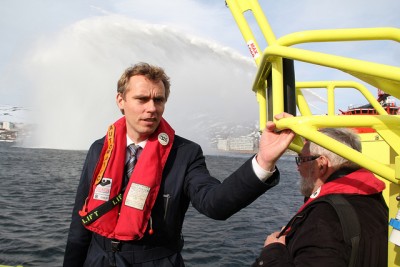Norway’s Oil & Energy Ministry knew as early as 2013, when it was under the political control of former Oil Minister Ola Borten Moe, that already-controversial oil exploration in Norway’s Arctic could also generate huge losses. Moe’s ministry nonetheless withheld information about the potential losses from Parliament, which ultimately voted to allow Arctic oil drilling and production.

That allowance has in turn led to a major lawsuit filed against the state to halt Arctic oil projects, which will be up before Norway’s Supreme Court next week. It’s in connection with that upcoming trial, Norwegian Broadcasting (NRK) reported on Tuesday, that information about the potential losses in the Arctic finally has emerged.
The environmental organizations behind the lawsuit, including Greenpeace and Young Friends of the Earth, view the withholding of reports of potential losses on Arctic oil projects as “serious and problematic.” They note that the Parliament did not receive important information relevant to its decision to open up the Arctic, not least because “taxpayers’ money covers 78 percent of the cost of exploring for oil in Norway. The government already knew in 2012 that exploration might be unprofitable. Neither the taxpayers nor the Parliament were let in on the secret.”
It wasn’t until August 21 that state attorneys defending the government against the environmentalists’ lawsuit filed the potential loss reports with the Supreme Court. State defenders have already apologized that the information about potential losses to the state on Arctic oil operations also wasn’t included when the lawsuit was heard at the local- and appeals court levels, and the state prevailed.
“This is sensational and without precedent,” Hans Petter Graver, a law professor at the University of Oslo, told NRK. He thinks the startling omissions in Moe’s ministry’s report to Parliament seven years ago can amount to serious legal violations.
“You have to ask yourself whether this (the omissions) was intentional,” Graver said. “It’s almost unbelievable that the ministry has misled both the Parliament and the courts, even if this can be blamed on a mistake.”
At issue are the values assigned to potential offshore oil reserves in the Norwegian-controlled portions of the Barents Sea. Parliament was led to believe back in 2013 that they could amount to as much as NOK 280 billion, but actual calculations for the value estimates weren’t included in the report.

NRK now reports that the calculations had concluded that even a 30 percent fall in record high oil prices at the time would result in losses after high oil exploration and extraction expenses. Even when oil was selling at USD 120 a barrel, there was a 25 percent chance that the values of reserves in the area known as Barents Southeast would be negative.
Any profit that might be realized (if oil prices had stayed as high as they were at the time) wasn’t expected to exceed NOK 50 billion, much less than the NOK 50 billion-280 billion range that Moe’s ministry presented to Parliament.
Oil prices have since tumbled to just over USD 40 this week. Some exploration already carried out in the Barents has been disappointing, and already exposed the state to its risk (through the tax incentives granted to oil producers) of covering losses.
NRK reported Tuesday that Moe’s ministry also asked professional experts at the state petroleum directorate to delete estimated values of some Arctic oil reserves covered in the report to Parliament delivered in 2013. One ministry official working under Moe even noted on a draft report from the directorate that directorate officials should “make sure” they didn’t “downplay” the potential value of the Barents Southeast area that borders on Russia’s portion of the Barents Sea.
Email ‘nausea’
According to emails connected to preparation of the Arctic oil report to Parliament, the ministry did not want value estimates of oil fields around either Barents Southeast or Jan Mayen to be a theme in the report. In another mail dated May 20, 2013, and published by NRK, it’s made clear that “value setting” was “taken out” of the report after “discussion” with a ministry official “who doesn’t want any ‘new’ information before Parliament handles the case.”
Other earlier mails indicate how senior economists and advisers at the bureaucratic level were frustrated by how the ministry was handling the process of compiling reports about potential Arctic oil reserves and their values. Their work was edited and seemed all but dictated by the ministry, prompting one professional in the directorate to describe feeling “the beginnings of nausea … but that’s perhaps an overreaction.”
Parliament eventually approved Moe’s and the left-center government’s proposal to allow oil exploration and production in the Arctic on June 19, 2013, just before the summer recess. Arctic oil activity, however, has remained as controversial as ever.

Former Oil Minister Moe, who remains active in the pro-oil Center Party but now works in the oil industry himself, claims the Parliament “received all relevant information” at the time. He pointed, when questioned by NRK, to the oil and gas that has been found on the Castberg, Snøhvit and Goliat fields in the Arctic, and Shtokman on the Russian side of the Barents.
“Then it’s not unthinkable that there’s something in between them, so the question Parliament had to answer was whether anyone was interested in finding out whether we had resources in Barents Southeast or not,” Moe told NRK. “If yes, then we had to open up, you have to explore.”
He referred to the value estimates as “just an internal note made by the directorate” of which neither he nor other political leaders were aware. Moe claims value estimates are only relevant “after you’ve opened up for exploration, and found something to evaluate.”
“So I think the Parliament is fully clear that without drilling and eventually finding something, you don’t know what’s there,” Moe told NRK.
‘Arrogant and disrespectful’
Law Professor Graver, who specializes in public management, is unimpressed by Moe’s defense. “Even though the state claims such estimates are always uncertain, and there was a political majority to open up the Arctic anyway, it’s arrogant and disrespectful of the law to claim that we can just ignore such a mistake,” Graver told NRK. “In this case the state has violated its own elementary duty to illuminate issues objectively. The ministry’s handling of this should be examined closely when the lawsuit is over.”

Graver noted that the law currently demands an evaluation of the economics of oil activity before new oil fields are opened up. “Here we have a situation in which both the rules for managing a case (the proposal to open up the Arctic) and for handling a lawsuit have been broken,” Graver told NRK. “This also raises questions about whether constitutional rules have been broken regarding the government’s (ministry’s) obligations for informing Parliament.”
Former Climate and Environment Minister Ola Elvestuen of the Liberal Party is also angry that “the red-green (left center) government held back information. The Parliament didn’t get the knowledge available about the risk that Barents Southeast would not be profitable. They had knowledge that they didn’t share, and that can’t be justified.”
Ole Berthelsen, current communications director at the oil ministry, claimed that “an error” in the ministry’s system was behind the ministry’s failure to deliver the withheld information to the Oslo County Court when the lawsuit against the state began in 2017. He also blamed “great uncertainty around the value of petroleum activity” for the differences in value estimates made in internal documents and those published in official reports.
NewsInEnglish.no/Nina Berglund

